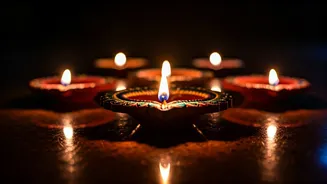Diwali Date Decoded
The first essential aspect of planning Diwali celebrations is knowing the accurate date. For Diwali 2025, the festival is projected to occur either on October
20 or October 21. Determining the exact day involves considering the lunar cycle, as Diwali is celebrated on the new moon day (Amavasya) of the Kartik month in the Hindu calendar. Several factors, including regional variations and the specific time of the new moon, will ultimately determine the official Diwali date. Therefore, it's wise to keep an eye on reliable sources like the Hindu calendar and local authorities to obtain the definitive date for your area. This will help you plan your festivities effectively, ensuring you don't miss any of the essential rituals and celebrations.
Rituals and Traditions
Diwali is deeply rooted in several rituals and traditions that emphasize the victory of light over darkness and good over evil. The core of Diwali celebrations involves cleaning and decorating homes with colorful lights, lamps (diyas), and intricate rangoli designs to welcome the goddess Lakshmi, who is believed to bring prosperity and wealth. Families exchange gifts, sweets, and blessings, strengthening bonds. Performing Lakshmi Puja is an essential aspect of Diwali. This is typically done during the evening. Fireworks displays add to the festive atmosphere, symbolizing the triumph of light and joy. Beyond these common observances, many families also engage in additional customs unique to their region or community, adding rich cultural layers to their Diwali celebrations, ensuring that the essence of Diwali is maintained every year.
Festive Celebrations Galore
Diwali is a time for joyful celebration, with communities coming together to revel in the spirit of the festival. Markets and streets are filled with shoppers and festive stalls. Special Diwali fairs are arranged in many cities, offering an array of products, from traditional attire to decorative items and sweets. The exchange of gifts and the sharing of festive meals play a significant role. Friends and family gather to enjoy delicious food and participate in games and cultural performances. For many, Diwali also presents an opportunity to start new ventures or buy essential items, adding economic significance to the celebrations. Each year, the collective joy and togetherness mark Diwali as a vibrant tapestry of community and festive enjoyment across India, fostering a shared sense of cultural identity.
Diwali's Cultural Significance
Diwali holds profound cultural significance, rooted in several historical and mythological narratives. Primarily, it commemorates Lord Rama's return to Ayodhya after fourteen years of exile, symbolizing the triumph of good over evil. Diwali also honors the victory of the goddess Durga over the demon Mahishasura. Beyond these major stories, Diwali also commemorates other events. These stories emphasize the triumph of light and knowledge. Diwali also signifies fresh starts, new beginnings, and the renewal of hope. This festival encourages people to reflect on their lives, forgive others, and foster kindness and compassion, making it a perfect occasion to reconnect with loved ones and express gratitude for the blessings of life.
Financial & Economic Impact
Diwali significantly impacts India's economy and financial markets. It’s a period of elevated consumer spending, where people invest in gold, real estate, electronics, and various other goods. Retail sectors experience a massive surge in sales. Businesses observe the Diwali season as a time to boost their revenues through special offers, discounts, and festive promotions. The stock market often sees a positive trend, especially during the Muhurat trading session. This brief trading period is considered auspicious. This economic activity reflects Diwali’s role as a driving force in the country's economy, boosting various industries and creating opportunities for economic growth. This period is thus marked by heightened financial transactions across various sectors.













